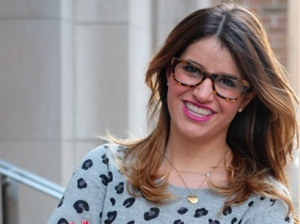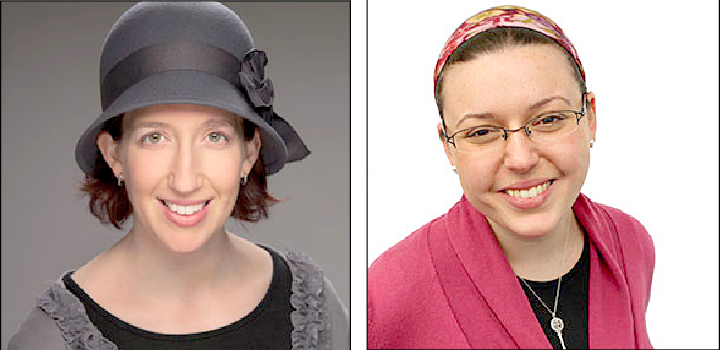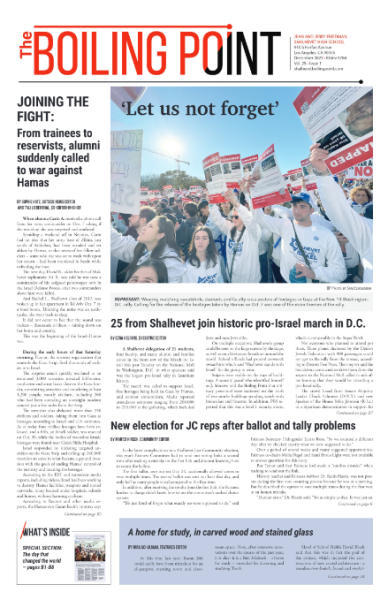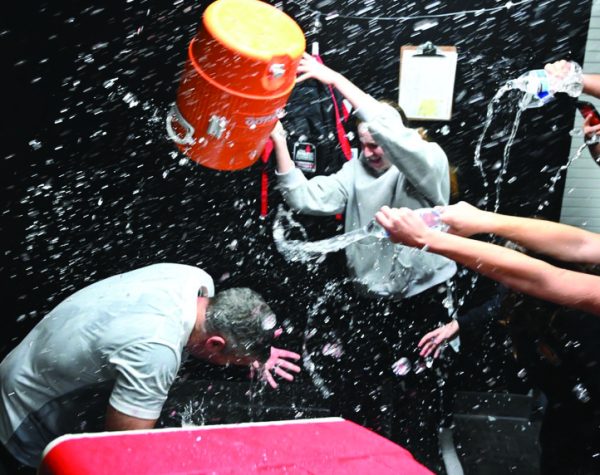Evolution of a title ensnares potential new faculty hire
LEADERS: Maharat Rachel Kohl Finegold,left,works at Congregation Shaar Hashomayim in Montreal. Maharat Ruth Balinsky Friedman, right, works at Congregation Ohev Sholom: The National Synagogue in Washington, D.C. All graduates of Yeshivat Maharat have found positions where they can use their title.
April 27, 2015
When Ms. Ramie Smith visited Shalhevet as a prospective teacher this past January, she met with students, teachers, parents and the board of Shalhevet. By all accounts, she was a hit.
“I thought she really liked the school and the school seemed to really like her,” said senior Shana Chriki, who met with her and discussed a range of topics, including Israel programs.
But to the surprise of many, when Head of School Rabbi Ari Segal announced the hiring of four new staff members for 2015-16 April 17, Ms. Smith was not one of them.
“Her values coincided with those of Shalhevet and it would be nice to have a woman that girls can go to when they have halachic questions,” Shana told the Boiling Point. “I thought she was a really good fit for Shalhevet, and I’m shocked she wasn’t hired.
Ms. Smith is a graduate of Yeshiva University with a bachelor’s degree in English communications, and a focus in Women Studies. Among other positions, she has served as congregational intern at Beth Sholom Congregation and Talmud Torah in Potomac, Maryland, where she taught classes and worked with local Jewish teens.

TALMIDA: Ramie Smith, who visited Shalhevet in earlier this year, is a fourth-year student at Yeshivat Maharat in New York.
She also is soon to complete four years of study at Yeshivat Maharat in New York – the same program as Alissa Thomas-Newborn, currently Kehilla Intern at Bnai David-Judea Congregation. That would seem to make her a good fit for Shalhevet, the first Orthodox high school on the West Coast where male and female students learn Gemara together, and the first to have a female Gemara teacher, Mrs. Atara Segal.
Rabbi Segal would not say what happened, but he agreed that Ms. Smith would have been a welcome addition to the staff.
“We would have been happy to hire someone that graduated from there,” said Rabbi Segal in an interview April 22. “We would have been honored to hire her.”
Ms. Smith declined to be interviewed by the Boiling Point. But although no one was willing to speak for the record, multiple sources throughout the Pico-Robertson community have told The Boiling Point that Ms. Smith was in fact offered the job, but turned it down because she would not have been called maharat – the professional designation being used by all other graduates of the yeshiva. Their curriculum is virtually the same as that of men who receive rabbinic smicha, or ordination.
Rabbi Segal and Rabba Sara Hurwitz, the dean of Yeshivat Maharat, would not discuss Ms. Smith, citing the confidentiality of employment matters.
But if the title was the problem, her situation was part of an evolving tangle not so much over what women can do in Orthodox Judaism, but what they can be called.
Maharat is a Hebrew anagram which stands for manhiga, hilchanit, Toranit, which means spiritual leader, teacher of Torah, expert in halacha. Yeshivat Maharat has graduated five women so far, and will graduate six more this June. All graduates so far have called themselves maharat.
“Every single student has a title that we think is important to reflect that they have ordination,” said Rabba Hurwitz. “We work with organizations to come up with a title to reflect the degree – ordination – and we really are also trying to stay aligned with where the community is politically.”
However, all five graduates so far have found positions where they are called maharat, she said. No other title has so far been given to a graduate.
Maharat Ruth Balinksy Friedman, a member of the yeshiva’s first graduating class in 2013, is maharat at Congregation Ohev Shalom: the National Synagogue in Washington D.C.
“I believe that my title is important because it conveys to the community that I have completed the necessary amount of study and training to serve as a member of the clergy,” said Maharat Friedman in a telephone interview.
“My training and responsibilities are on the same level as those of what a male rabbi would have, and we serve similar functions. This is important not only to giver proper recognition for the training, but also to convey that women and men should both be respected equally for their work.
“Just as we would not refer to our female doctors only by their first names,” she added, “we should not refer to our female clergy without a title that recognizes their accomplishments.”
Shalhevet Judaic Studies teacher Rabbi Ari Schwarzberg said that for some, the title itself – not the training or what it qualifies women to do – is the problem.
“I think the issue of the title maharat in the Modern Orthodox world is that it is still a politically charged title, and Yeshivat Maharat is still not widely accepted across the Orthodox world,” Rabbi Schwarzberg said.
“For Shalhevet to recognize someone and give the name maharat could be something that could cause Shalhevet as an institution to be seen as less mainstream than it actually is.”
Rabbi Segal agreed with Rabbi Schwarzberg that it is a fairly new title, and said he did not know what a maharat who taught at Shalhevet would be called.
He compared maharat to other titles for women in positions of Orthodox Jewish leadership, such as rabba and yoetzet halacha – a relatively new designation given to women empowered to make rulings on issues involving women’s changing status of ritual purity.
Women trained as yoetzot are now making decisions once assigned only to rabbis, and a yoetzet halacha visits Los Angeles from Israel every few months and is available by phone an internet.
“The community makes those decisions about whether a title is appropriate,” Rabbi Segal said, “You need look no further than yoetzet halacha to see that there are new titles, and those titles can become accepted within our community.”
The term yoetzet halacha, meaning halachic advisor, is associated with Nishmat, a school in Katamon, Israel, founded in 1990 by Rabbanit Chana Henkin and focused on women’s higher learning and leadership. The term has received recognition throughout the Modern Orthodox community.
“You have yoetzet halacha and that was a new title, and for a lot of complex reasons that was accepted, and you had rabba, which got pushback,” said Rabbi Segal.
Rabba, which is a feminine version of the word rabbi, was first used by Rabbi Avi Weiss, who founded Yeshivat Maharat in 2009. He gave smicha with that title to Rabba Hurwitz, and was greeted with lots of controversy.
Rabbi Avi Shafran, the spokesman for Agudath Israel of America, spoke strongly against the title maharat in an interview with the Boiling Point.
“The maharat title is universally and correctly understood as a ruse, instituted when the original rabbah proffered by an ‘Open Orthodox’ leader was roundly condemned,” said Rabbi Shafran.
Rabbi Schwarzberg said the situation is still evolving.
“This is part of the growing pains of the Orthodox community,” said Rabbi Schwarzberg. “Whenever a community goes about change, people will be at different parts. Change needs to be gradual and shouldn’t become the reason for greater separation within the community.”
Rabbi Segal added that his positions on contemporary issues evolve.
“I never put my decisions in stone,” Rabbi Segal stated. “I stand behind them firmly, I don’t change them willy-nilly because some people complain or don’t like my decisions. In any decision I have ever made, if someone says to me will you reconsider, my answer is always yeah, I am happy to reconsider.
“There’s always a heavy calculus and I am always willing to reevaluate whether the school has changed, the community has changed, or the world has changed.”
This story won a 2015 Simon Rockower Award, Second Place for Excellence in Reporting About Women.














Alex A • May 8, 2015 at 1:03 pm
I completely agree with Jacob Suslovich’s comment. I cannot believe the comment quoted from “Maharat” Ruth Balinsky Friedman of Ohev Shalom in Washington D.C. – “Just as we would not refer to our female doctors only by their first names,” she added, “we should not refer to our female clergy without a title that recognizes their accomplishments.” – Scary!!! I don’t know as much as some of the most vocal pundits of Rabbi Weiss’s latest “projects” nor do I necessarily agree with all of their statements or their point of views denouncing Chovevei Torah or “Open Orthodoxy” or Yeshivat Maharat. However, statements like those don’t help Yeshivat Maharat, its graduates, or their new title gain acceptance within the confines of the current mainstream Orthodox community or Halachik Judaism. Obviously the conferring of “semicha” and the title of “Rav” or any equivalent of it cannot and should not be compared to the title of “Dr.” or “Attorney” or “CPA”. Semichah and the title of “Rav” or the equivalent thereof is not a university degree or a professional certificaton – it is a halachik title, even if not an entirely purely spiritual one today. The fact that Mrs. Ruth Balinsky Friedman seems not to accept that concept makes it kind of seem that “Yeshivat Maharat” is doing this from a different motivation than simply training qualified and educated female Torah teachers and halachik guides as the title might suggest. Rather, Mrs. Ruth Balinsky Friedman’s statement would suggest that the motivation for the program and graduating title that is conferred upon the graduates comes from the world of current “western” values of gender equality, social equality, and feminism. Those are values that the Conservative and Reform movements of “Judaism” embraced with open arms not long after they became quite in vogue within “western” society, about 40 years ago. Needless to say, neither of those movenents is recognized as being of any legitimate reflection of Torah Judaism whatsoever. If as Mrs. Ruth Balinsky Friedman’s statement would indicate, the quest for the realization of those popular “western” values is indeed the motivation and pathway of Open Orthodoxy and Yeshivat Maharat, then the answer to the question of its legitimacy within real Torah Judaism to me is an obvious one. The much maligned quote or misquote that was attrbuted to the approach of some Modern Orthodox Rabbis at the time that it was actually originally quoted or misquoted that “when there is a ‘Rabbinic’ will, there is a Halachik way” should obviously not apply to a Judaism that is a Torah based one. I am a graduate of YU so you cannot say that I am coming from an ultra-orthodox world and background.
Jacob Suslovich • May 4, 2015 at 7:43 pm
“Rabbi Segal added that his positions on contemporary issues evolve.”I am always willing to reevaluate whether the school has changed, the community has changed, or the world has changed.”
So it is the school and community that governs our values not the other way around. This does not seem like a Judaism that follows the dictates of the Torah. Rather it is one where the Torah is bent to conform to the latest contemporary ism.
Allen Gerstl • May 4, 2015 at 9:32 am
We have legitimate Jewish sources for equalitarianism (as an example see Mishneh Torah, Hilchot Shemitah Ve-Yovel 13:13) that provide that a person who who has devoted himself or herself to the service of God, including through selfless pursuit of Jewish scholarship for such purpose of serving God, should be respected for doing so. I don’t see how the refusal to use a newly coined term shows a lack of honor and respect, although a refusal to use such a term may simply show a refusal to accept a certain social-political ideology.
Tania • May 3, 2015 at 7:14 pm
l’ve just lost my appetite. We’ve come so far in life to accord women the greatest of honors and for some that isn’t enough. Her Royal Highness Rami Smith might change her profession and status because people who go with their ego are not meant to be running a classroom. Since when did Morah become a degradation? Since when do children care about names and titles of their teachers? Just don’t call me late for dinner.
Fran Kritz • May 3, 2015 at 4:33 pm
This seems to be a wonderful opportunity for a Shalhevet Town Hall meeting.
It seems to me that Ramie Smith spent four years at Yeshivat Maharat not just to be called a Maharat but to choose the path of her chosen profession that most appealed to her–teaching.
I think it is a vote of confidence that Shalhevet would have interviewed and potentially chosen her to teach. Not all is gained b’shaa achat. Like yoatzot and women board members of shul, and women presidents of shul and rabbis ordained by Yeshivat Chovevei Torah, pioneers often must prove themselves. That is often and usually the case.
I think that if teaching is important to Ramie Smith, and I’m sure it is, she might put that first, and understand that the road to fuller accept of her title is ahead and probably not far off.
But…I would love to hear what the Shalhevet students think.
Fran Kritz, Silver Spring, MD